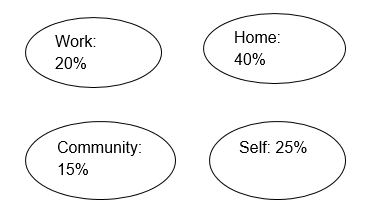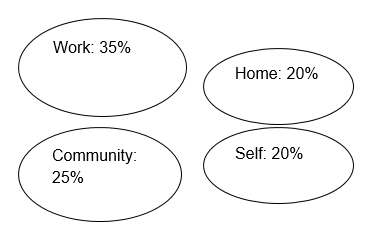Abraham Maslow’s Motivational Theory
The Definition of Happiness (Self-Actualization Level)
My interpretation of happiness as self-actualization is concerned with reaching my full potential and succeeding in creative activities and sports, work, and personal life. These issues are the most important in my present life, and I would like to work on my self-development in order to have the most positive outcomes in this dimension in the future. I would like to reach a balance between my activities and create a plan that could help me gain happiness as I have defined it for myself.
Bandwidth Analysis for the Remaining Four Levels
Physiological needs:
- The “good enough” level is having a place to live in and being able to feed myself. Also, I need the possibility of having rest from my work and studies. Finally, a regular sleep pattern is included in this level.
- The “aspiration” level includes having my own apartment. Also, it involves being able to have a vacation twice a year. Finally, I would like to have a small house in the mountains.
- Currently, I am at the “good enough” level: I have basic things to satisfy my physiological needs.
Safety needs:
- The “good enough” level is being protected from criminals. Also, the requirements include stability at work and at the university. Finally, I need to know some self-defense methods to escape an attack.
- The “aspiration” level involves having a place to live that would protect me from natural disasters. Also, it includes a security system at home that could guard me against external harm. Finally, the “aspiration” level presupposes being able to afford the services of a lawyer.
- I am below the “good enough” level: I cannot walk freely in the streets without being afraid that someone might attack me.
Belongingness and love needs:
- The “good enough” level is having my family close to me and receiving their support. Also, this level involves a feeling of belongingness to some social groups such as co-workers or co-learners. Finally, I need someone whom I could trust and talk to about intimate topics.
- The “aspiration” level includes building my own family and having a loving spouse and children. Also, this level involves having a very close friend with whom I could share anything and not be afraid of being judged or betrayed. Finally, I would like to become such a friend to someone else and to be a person whose opinion matters to others.
- Right now, I am below the “good enough” level since my family is far away from me.
Esteem needs:
- The “good enough” level includes the feeling of doing something right and being considered a dignified individual for it. Also, esteem needs at this level presuppose being accepted by society as a worthy and equal person. Finally, this level incorporates being encouraged to aspire to do better because what I am doing currently is good.
- The “aspiration” level includes attaining something outstanding in sports and becoming popular for it. Another possible esteem aspiration is becoming very successful in my future work and gaining world fame for it. Finally, I would like to do something to inspire others.
- I am at the “good enough” level: I succeed in my endeavors, and my colleagues and friends value me for who I am. I am regarded as an equal in any social group.
Stew Friedman’s Psychological Theories
Friedman’s Four Circles: The Actual Situation

My physiological needs are largely satisfied in the “work” and “home” circles. My job gives me money to buy food and pay the rent, and my apartment provides me with the necessary shelter. Safety needs are mostly concerned with the “home” and “self” circles. To a great extent, my home is a protection from attack. Since I live alone, I am the one responsible for my safety. Belongingness and love needs are relevant to the circles “home” and “community.” I seek support and amiability in my family as well as at work and at the university. To satisfy esteem needs, I refer to the circles “work” and “community.” The people surrounding me and seeing my work are the ones who can notice my achievements and praise me for them.
Friedman’s Four Circles: The Desired Balance

To satisfy my physiological needs better, I need to increase the time devoted to work so that I can earn more money. This would also enable me to attain my esteem needs in the long run. I should also spend more time on community relations in order to have better results in the spheres of belongingness and love and esteem. Currently, I am spending too much time on my leisure activities. Thus, as a percentage, I do not want to alter my “self” circle too much, but I would like to change the quality of activities belonging to it. I should spend time on self-development rather than on having fun and wasting precious hours and days on unnecessary things.
How Balanced I Am
I have to admit that I am not balanced enough. I spend too much time on thoughtless activities such as playing games on my smartphone or just sitting and doing nothing. What I really need to improve in the near future is my time management. Because of my inability to allocate this resource optimally, I frequently suffer at the university. Without spending enough time on preparing or revising some project, I often do not receive the score I wish.
Another problem is that there is a large gap between my “walk and talk” and reality. I am interested in many educational and other activities, but then I fail to join them or receive good results from them. The next crucial aspect affecting my balance is insufficient interpersonal and intrapersonal communication. Not only do I spend too little time talking and listening to my friends and family, but I also rarely listen to my own thoughts and almost never engage in self-analysis. I think that as soon as I cope with these issues, my esteem needs will move to the “aspiration” level.
How I Will Move to the Desired Balance
In order to reach the desired balance, I will employ the strategies offered by Friedman. In particular, here is what I can do in each dimension:
- Be real: I should make my “walk and talk” correspond to reality and behave in a way that would demonstrate that I am a responsible person;
- Be whole: I will draw boundaries between work and leisure and create networks of support to and from others;
- Be creative: I should leave my comfort zone, become more determined, and work harder to align myself with the values of accountability and self-sufficiency.